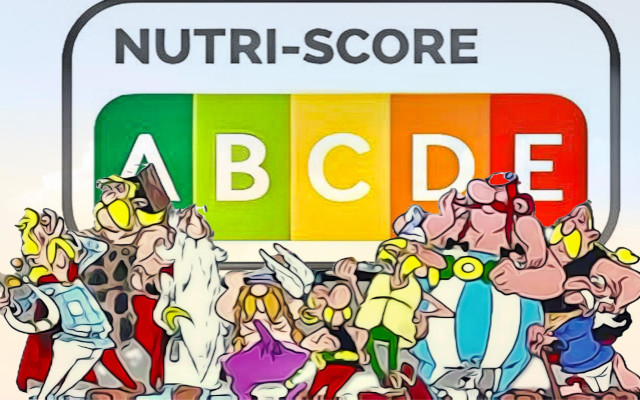On 4 November 2024, the National Assembly in Paris voted in favour of two amendments proposing to make the Nutri-Score mandatory on food labels in France and to promote its display on advertising material. (1)
These amendments, included in the draft law on the financing of social security in 2025, fully respond to the demands of civil society. Consumers, patients, doctors and health researchers (2,3).
1) France, chronic diseases and unbalanced diets
‘The latest Health Insurance report reveals a worrying increase in chronic diseases [+4%/year, ed.], with three main ones in the lead: mental health, cancers and cardiovascular diseases,’ state the justifications for the amendments.
‘While these diseases have multiple causes, the second most involved factor remains a diet too high in fat, salt, sugar and low in fibre. Diet is responsible for about 30 per cent of deaths due to cardiovascular disease’.
2) Nutri-Score, the nutritional label par excellence
Nutri-Score is a synthetic nutritional labelling system – devised by Santé Publique France, Anses (Agence nationale de sécurité sanitaire de l’alimentation, de l’environnement et du travail) and Haut Conseil de la Santé Publique – comprising a literal (A to E) and chromatic scale.
This nutritional labelling system was ‘recommended by the French Ministry of Health, welcomed by the WHO, consumer organisations and health professionals. (4) And it was acclaimed by the public, with 91% favourable feedback’.
3) National Assembly, green light for mandatory Nutri-Score
The National Assembly in Paris approved at first reading the two amendments to the ‘Projet de loi pour le financement de la sécurité sociale (PLFSS 2025)’, which provide both a compulsory introduction of the NutriScore logo on labels and a tax incentive for their display in food advertising in France.
‘Chronic diseases are increasing by 4% every year (…) and our [health] system is in danger,’ said Cyrille Isaac-Sibille (Les Démocrates, author of the two amendments. ‘The objective is not to ask the French to give up certain foods, but to inform them about the risks to their health and encourage them to adapt their consumption accordingly’.
4) Majority in favour, some votes against
Mandatory labelling with the Nutri-Score system was supported in particular by MEPs from the Socialist (Jérôme Guedj), ‘La France insoumise’ (Hadrien Clouet), and ‘Ecologiste et social’ (Sabrina Sebaihi) groups.
The reformulation of food products, in order to improve their nutritional profiles, is in fact one of the objectives that NutriScore has already demonstrated its ability to achieve, as revealed by the Yuka app that is based on it. (5)
By contrast, ‘Rassemblement national’ (Joëlle Mélin) and ‘Droite républicaine’ (Thibault Bazin) fear the possible classification of local products with Nutri-Score D or E. Although studies show the contrary. (6)
5) Government in the balance
Health Minister Geneviève Darrieussecq declared herself in favour of the evolution of the Nutri-Score algorithm, in fact already updated in 2023 (7.8). And above all to its harmonised application at EU level, as suggested in a recent European Parliament report. (9)
However, the French government has spoken out against the amendments under consideration. Indeed, the minister stated that ‘the Nutri-Score is an important element, but the current legislation cannot make it compulsory, as it is an issue that has already been raised at European level’.
6) Possible solutions
The National Assembly proposed approach could be slightly adjusted to ensure its compliance with EU law. Thus:
-introduce a purposive taxation (i.e. x% on the final price, in favour of the ‘Caisse nationale de l’assurance maladie’) on all pre-packaged food and beverages, varying according to their Nutriscore score;
-exempt from this tax (or reduce it, in the case of an E score) those products whose labels and advertising (online and offline) voluntarily display the Nutri-Score logo.
It is therefore a question of applying to food labelling the same criterion already envisaged to incentivise the display of the NutriScore in advertising. Reserving in any case the opportunity to tax products with the most unbalanced nutritional profiles, in line with WHO recommendations. (10)
Dario Dongo
Footnotes
(1) Maxence Cagni. Alimentation: Lea députés veulent rendre obligatoire l’affichage du Nutri-Score. LCP Assemblée Nationale. 4.11.24 https://tinyurl.com/3w4uazdj
(2) Taxes sur les produits néfastes dans le PLFSS 2025 pour une alimentation plus saine et plus durable : à consommer sans modération ! France Assos Sante. 28.10.24 https://tinyurl.com/5n8ttmc7
(3) Dario Dongo.Nutriscore, the doctors‘ and scientists’ appeal in Paris. GIFT (Great Italian Food Trade). 28.10.24
(4) Marta Strinati. EU public health, EUPHA, points to NutriScore as best option for FoPNL. FT (Food Times). 20.3.23
(5) Marta Strinati. Yuka stimulates food reformulation and works on eco-score. FT (Food Times). 16.8.22
(6) Dario Dongo. NutriScore, full marks to local products. And food quality improves. FT (Food Times). 14.4.23
(7) Dario Dongo. NutriScore, evolution of the scientifically based algorithm. GIFT (Great Italian Food Trade). 1.8.22
(8) Dario Dongo. NutriScore, algorithm update for beverages. FT (Food Times). 25.4.23
(9) Dario Dongo. Obesity, challenges and opportunities. EU report. GIFT (Great Italian Food Trade). 21.10.24
(10) Dario Dongo. Fiscal policies for balanced nutrition, WHO recommendations. FT (Food Times). 4.7.24
Dario Dongo, lawyer and journalist, PhD in international food law, founder of WIISE (FARE - GIFT - Food Times) and Égalité.








